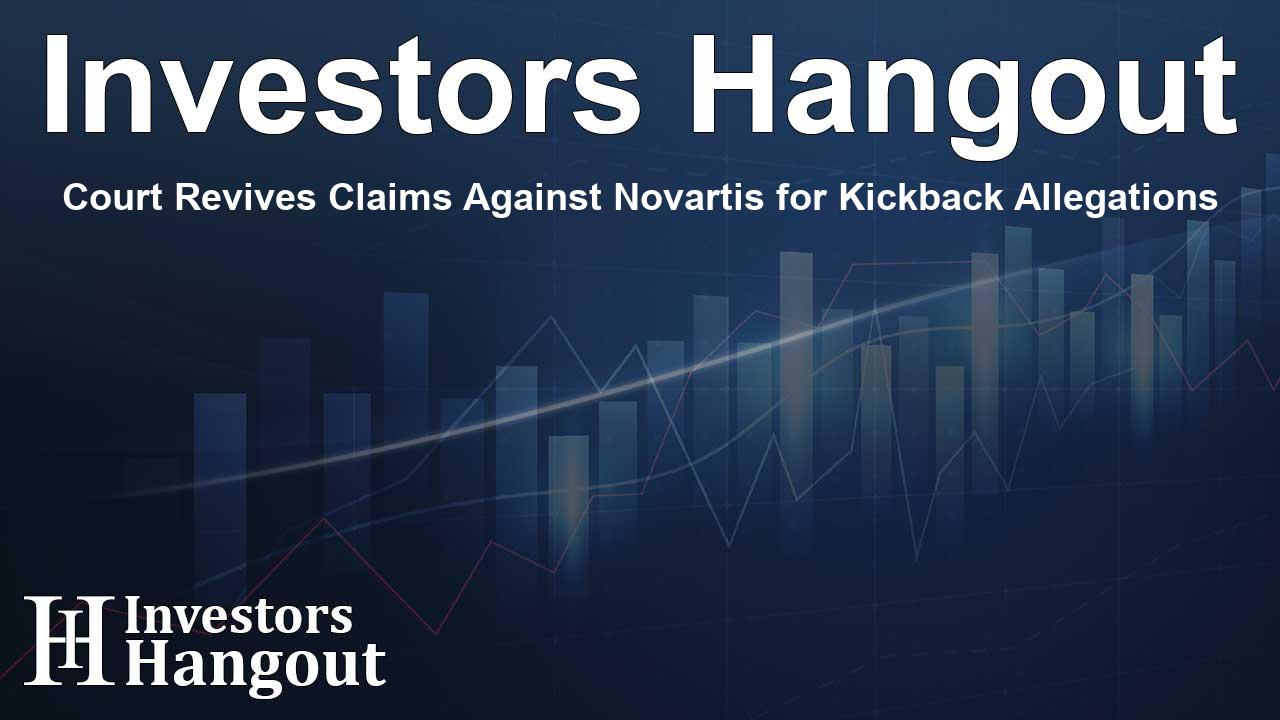Court Revives Claims Against Novartis for Kickback Allegations

Whistleblower Case Against Novartis Takes a New Turn
By Jonathan Stempel
A recent ruling from a U.S. appeals court has brought to light serious accusations against the Swiss pharmaceutical giant, Novartis (SIX: NOVN). A whistleblower lawsuit claiming that Novartis engaged in illegal kickback practices to promote its prominent multiple sclerosis treatment, Gilenya, has been revived. This decision signifies a crucial moment in the ongoing scrutiny of pharmaceutical marketing practices.
The Allegations of Kickbacks
The ruling from the 2nd U.S. Circuit Court of Appeals permits whistleblower Steven Camburn, a former sales representative for Novartis, to present evidence that the company violated the False Claims Act. Camburn alleges that Novartis organized misleading speaker events intended solely to increase Gilenya's sales rather than to educate medical professionals, an assertion that puts the drugmaker in the crosshairs of ethical and legal oversight.
Details of the Whistleblower's Claims
Camburn's allegations include instances where Novartis reportedly compensated physicians with significant payments and luxurious dinners to secure their participation in these purported educational seminars. However, many of these events were characterized as social gatherings, lacking genuine educational value. This manipulation, Camburn argues, misled government health programs like Medicare and Medicaid, which may have processes to reimburse prescriptions that were arguably influenced by these illicit incentives.
Legal Context and Implications
Circuit Judge Myrna Perez's ruling underscores the potential severity of these claims, noting that Camburn's assertions create a robust basis for inferring that Novartis intended to commit fraud. The implications of this case extend beyond Novartis, also signaling to other pharmaceutical companies regarding the strict adherence to the federal Anti-Kickback Statute, particularly concerning incentives tied to federally reimbursable healthcare products.
Response from Novartis and Legal Developments
As the case unfolds, Novartis has not publicly commented on the recent court decision. Camburn's legal representation also refrained from immediate comment but is expected to engage vigorously as the case progresses back to U.S. District Judge Kimba Wood. Originally filed in May 2013, the lawsuit has traveled through various legal challenges, highlighting ongoing controversies regarding pharmaceutical marketing ethics.
Impact on Gilenya and Sales Trends
Gilenya, despite its past success, is facing significant challenges in the market due to increasing competition from generic alternatives. Sales have notably declined, plummeting to $925 million in 2023 from a peak of $3.22 billion in 2019, with only $443 million reported in the first nine months of 2024. This shift in market dynamics may further complicate Novartis's legal position as they navigate ongoing challenges both in sales and legal accountability.
Previous Settlements and Future Considerations
In a related development, Novartis faced scrutiny in 2020 when it agreed to pay over $729 million to settle allegations concerning illegal kickbacks intended to inflate drug sales. This history complicates the current proceedings and raises questions about the integrity of pharmaceutical marketing practices across the industry. With such broad implications, the outcome of Camburn’s case could affect not only Novartis but also establish precedents for compliance within the pharmaceutical sector.
Frequently Asked Questions
What are the main allegations against Novartis?
The main allegations claim that Novartis paid kickbacks to doctors to promote its multiple sclerosis drug, Gilenya, through misleading educational events.
Who is the whistleblower in this case?
The whistleblower is Steven Camburn, a former Novartis sales representative who initiated the lawsuit against the company.
What is the significance of the U.S. appeals court decision?
The decision revives the lawsuit, allowing Camburn to present evidence that Novartis may have violated the False Claims Act and other healthcare regulations.
How has Gilenya sales performed in recent years?
Gilenya's sales have declined significantly, from $3.22 billion in 2019 to $925 million in 2023, indicating increased competition and market challenges.
What legal precedent could this case set?
The case could establish important precedents regarding the enforcement of the Anti-Kickback Statute and pharmaceutical marketing practices in general.
About Investors Hangout
Investors Hangout is a leading online stock forum for financial discussion and learning, offering a wide range of free tools and resources. It draws in traders of all levels, who exchange market knowledge, investigate trading tactics, and keep an eye on industry developments in real time. Featuring financial articles, stock message boards, quotes, charts, company profiles, and live news updates. Through cooperative learning and a wealth of informational resources, it helps users from novices creating their first portfolios to experts honing their techniques. Join Investors Hangout today: https://investorshangout.com/
Disclaimer: The content of this article is solely for general informational purposes only; it does not represent legal, financial, or investment advice. Investors Hangout does not offer financial advice; the author is not a licensed financial advisor. Consult a qualified advisor before making any financial or investment decisions based on this article. The author's interpretation of publicly available data shapes the opinions presented here; as a result, they should not be taken as advice to purchase, sell, or hold any securities mentioned or any other investments. The author does not guarantee the accuracy, completeness, or timeliness of any material, providing it "as is." Information and market conditions may change; past performance is not indicative of future outcomes. If any of the material offered here is inaccurate, please contact us for corrections.